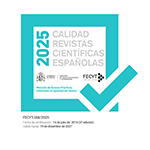La patria es el otro, pero no para siempre. La cuestión de la nación en el socialismo de la Argentina finisecular (1894-1912)
Resumen
Este trabajo aborda en el caso argentino un problema fundamental en la constitución del socialismo moderno durante la Segunda Internacional: el lugar de la nación y del nacionalismo en los partidos socialistas. Se toman en cuenta una pluralidad de voces e intervenciones que demuestran, a la vez que la temprana presencia de dicho problema en el socialismo local, una constante tensión identitaria dentro del mismo. Las fuentes analizadas evidencian la riqueza que adquirió la intromisión de los motivos nacionales en el Partido Socialista argentino, desde escritos regulares en la prensa partidaria y en órganos de reflexión teórica hasta conferencias a cargo de dirigentes e intelectuales de aquel, pasando por algunas voces críticas de las posiciones socialistas y de referentes internacionales del movimiento. La perspectiva adoptada comprende a los procesos identitarios en sus diferentes dimensiones analíticas y en sucesivos momentos que muestran los cambios operados en la mediana duración histórica. De acuerdo a la hipótesis de un temprano rechazo de las efusiones patrióticas desarrolladas en el país, se sostiene que, a partir de ese fenómeno más general que fue el nacionalismo, la recepción de los debates y resoluciones de la Internacional, así como de querellas internas al socialismo argentino, cobró forma hacia el centenario de 1910 una versión propia del patriotismo, el «buen nacionalismo», que intentó conciliar la base doctrinaria internacionalista con un nuevo contexto que marcará por décadas a esta identidad política.Descargas
Licencia
Aquellos autores/as que tengan publicaciones con esta revista, aceptan los términos siguientes:
a. Los autores/as conservarán sus derechos de autor y garantizarán a la revista el derecho de primera publicación de su obra, el cuál estará simultáneamente sujeto a la Licencia de reconocimiento de Creative Commons Reconocimiento-No comercial-Sin obra derivada 4.0 España que permite a terceros compartir la obra siempre que se indique su autor y su primera publicación esta revista.
b. Los autores/as podrán adoptar otros acuerdos de licencia no exclusiva de distribución de la versión de la obra publicada (p. ej.: depositarla en un archivo telemático institucional o publicarla en un volumen monográfico) siempre que se indique la publicación inicial en esta revista.
Plagio y fraude científico
La publicación de un trabajo que atente contra los derechos de propiedad intelectual será responsabilidad de los autores/as, que serán los que asuman los conflictos que pudieran tener lugar por razones de derechos de autor. Los conflictos más importantes pueden darse por la comisión de plagios y fraudes científicos.
Se entiende por plagio:
1.Presentar el trabajo ajeno como propio.
2.Adoptar palabras o ideas de otros autores sin el debido reconocimiento.
3.No emplear las comillas u otro formato distintivo en una cita literal.
4.Dar información incorrecta sobre la verdadera fuente de una cita.
5.El parafraseo de una fuente sin mencionar la fuente.
6.El parafraseo abusivo, incluso si se menciona la fuente.
Las prácticas constitutivas de fraude científico son las siguientes:
1.Fabricación, falsificación u omisión de datos y plagio.
2.Publicación duplicada.
3.Conflictos de autoría.












